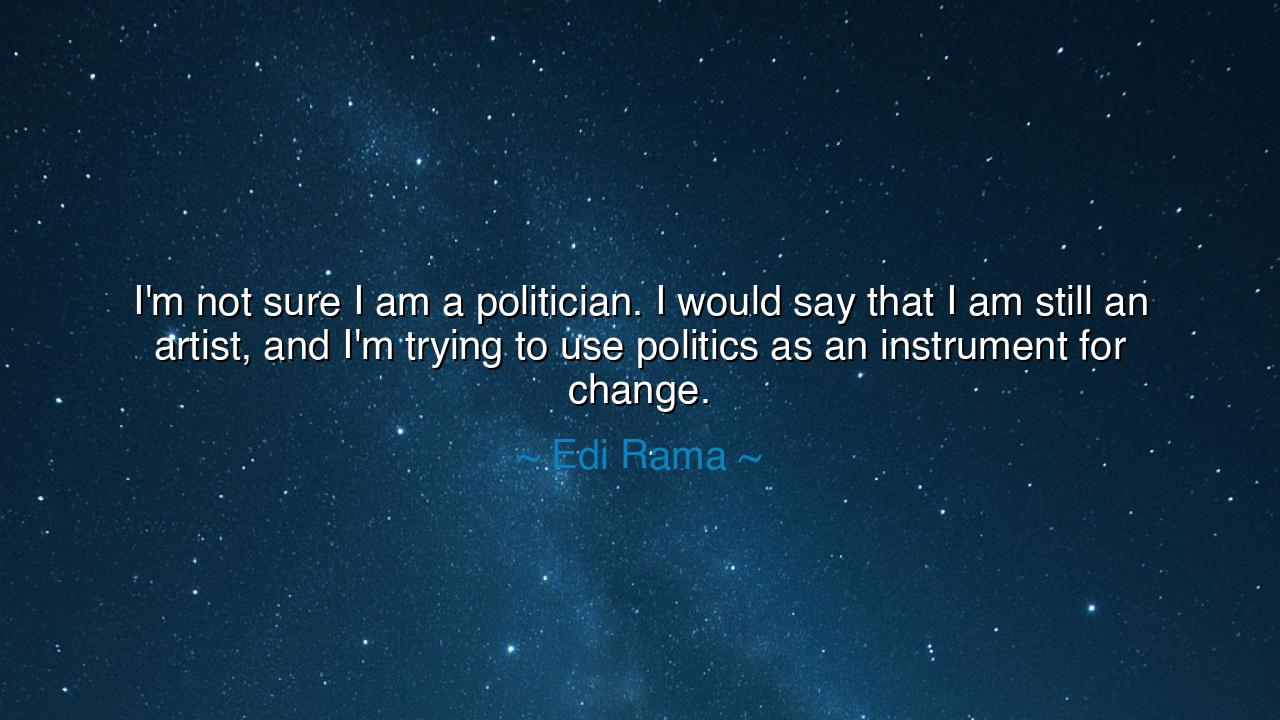
I'm not sure I am a politician. I would say that I am still an
I'm not sure I am a politician. I would say that I am still an artist, and I'm trying to use politics as an instrument for change.






The words of Edi Rama — “I’m not sure I am a politician. I would say that I am still an artist, and I’m trying to use politics as an instrument for change” — speak with the fire of a man who carries the soul of creation into the halls of power. In them lies a truth both profound and rare: that the vision of the artist, with its hunger for beauty, imagination, and renewal, may serve as a torch to light the often shadowed path of politics. Rama declares that he does not abandon art for power, but wields power itself as a canvas upon which to paint a more just world.
At the heart of this saying is the recognition that politics, when stripped of vision, is but machinery — gears of law and speech grinding endlessly. The artist, however, sees beyond the surface; he dreams of what does not yet exist, and he dares to create it. By calling himself an artist first, Rama proclaims that his purpose in governance is not to preserve the old, but to shape the new, to treat society itself as a work in progress, to carve hope where despair has hardened.
History offers kindred examples. Marcus Aurelius, though emperor, never saw himself only as a ruler but as a philosopher, wielding politics not for glory but for virtue. Václav Havel, a playwright in Czechoslovakia, became president and used the stage of governance to free his nation from tyranny, turning words into liberation. Like Rama, they remind us that those who bring imagination into power do not merely manage the world — they transform it.
His words also remind us of the dangers of forgetting art within power. Many rulers who thought themselves mere politicians became prisoners of expediency, compromising vision for survival. But to govern as an artist is to refuse to lose sight of the ideal, to hold beauty, justice, and humanity as the measure of all decisions. In this, Rama gives voice to a universal truth: that change comes not from the mechanics of rule, but from the creativity and courage of those who dare to reimagine society.
Let future generations remember this teaching: politics alone cannot save a people unless it is infused with vision, imagination, and the spirit of creation. The artist within the ruler is the guardian of hope, the defender of dreams, and the builder of futures. Edi Rama’s words remind us that to lead is not only to command, but to create — to shape the destiny of nations as an artist shapes stone, canvas, or song, until beauty and justice are revealed within the form.






GBPham Nguyen Gia bao
Edi Rama’s perspective on politics as a tool for artistic change resonates with me, but I’m curious about the practical side of this. If you approach politics as an art form, does it risk becoming too abstract or disconnected from the needs of the people? Could his artistic sensibilities hinder the necessary pragmatism that politics often requires, or is this just the kind of shift we need to address the challenges of the modern political landscape?
VDloc van dai
Edi Rama’s view of politics as a means to an artistic end is thought-provoking, and I think it opens up an interesting conversation about the intersection of creativity and governance. But I also wonder—does his 'artist' identity make him more idealistic or less pragmatic when it comes to the harsh realities of political life? Can an artist truly thrive in the world of power struggles and compromise, or will they eventually be forced to conform to the system?
TLQuang Tran Le
It’s intriguing that Edi Rama still identifies as an artist rather than a politician. I think it speaks to the idea that art can be a powerful force for societal change, something that is sometimes lost in the transactional nature of politics. But how effective can art be when used as a political instrument? Can the two really coexist without one overshadowing the other? I wonder how his approach differs from more traditional political figures.
KDKhanh Duong
Edi Rama’s statement about being an artist first rather than a politician is refreshing, but it raises an interesting question: Can one truly use politics as a tool for change if they are not fully immersed in it? Does his view risk undermining the seriousness of politics, or could it be the exact perspective needed to bring fresh ideas into a often stagnant political system? I’d love to hear more about how he balances both roles in practice.
TPTran Thien Phung
Edi Rama’s perspective is fascinating because it blurs the lines between art and politics. It’s rare to hear a politician admit they see themselves as an artist first. I wonder, though, if this dual identity ever creates a conflict for him. Can an artist truly thrive within the often rigid structure of politics, or does the political system limit the creativity and freedom that artists typically embrace? How can Rama maintain his artistic vision while navigating political compromises?